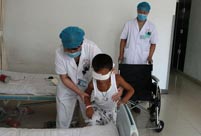Entrepreneurs are faced with host of decisions in a new tartup. One is whether to stay in the place their businesses were founded or relocate somewhere else. Must they go to big, crowded and expensive cities like Beijing and Shanghai?
Is it essential for them to be based in coastal cities close to some major port facilities? Not necessarily, according to John Xuz and Peter Zhou, two electronics engineers heading small but competitive computer chip companies in the ancient city of Xi’an, capital of Shaanxi province, a city best known around the world for the terracotta soldiers that guard the first emperor’s underground mausoleum built more than 2,200 years ago.
Neither is a native of the city, but both have their companies headquartered in the Xi’an Hi-Tech Zone, an investment park that hosts around 18,000 companies, according to its administrative committee.
Most of the companies there are small and privately owned, like the ones operated by Xuz and Zhou. International giants, like Samsung and Micron, a US-headquartered semi-conductor company, also have, or will soon have, major operations there. Domestic large corporations are also moving in, most noticeably Huawei and ZTE, two telecom equipment makers from based in the southern coast.
Xuz is a native of Wuxi, a lakeside city in the Yangtze Delta, and a long-time resident of Canada. He is CEO of Xi’an Tianxin Electronic Science Technology Co Ltd.
Peter Zhou grew up in Zhejiang, a southeastern coastal province, before he went to graduate school and obtained his doctorate in the United States. He is chairman of Xi’an HuaXun Microelectronics Inc.
Why did they choose Xi’an? It is an important city, no doubt, and every student of Chinese history will attest to that. But it lies far from any seaport or either man’s hometown, and is surrounded by rural areas that have been historically underdeveloped.
So why have these men elected to bring not only their businesses but also their families to Xi’an?
Xuz’s reason seems simple: “My wife is from the Xi’an area, and we have friends here.”
But that alone still may not be the sufficient reason for him to give up his comfortable life in Canada.
“I can feel more useful now that the products from my company are proving competitive on the market -- even at a time when profit margins are being squeezed by a cheaper Japanese yen and a more expensive Chinese yuan,” he said. “We have large orders from major clients.”
Xuz’s company makes chips for automobile central control systems and various vehicle equipment.
“Plus,” he said, half-jokingly, “The food here is not too bad.” He exchanged the fish dishes and fresh vegetables common in his hometown for noodles served in spicy and sour soup and the fruits he gets locally.
“Of course, the (Xi’an high-tech zone) is also supportive, along with the accommodation from the zone’s startup park,” he said, pointing to his new and spacious workshop.
The startup park is a facility built on orders from the Ministry of Science and Technology to help patent owners as well as scientists and engineers to launch their own ventures. They are located in the country’s several key university towns.
The XHTZ’s startup park is a government-commissioned service center for more than 800 technological ventures.
It contains several industry-specific “incubators” for nascent companies and one “booster” site for more-established firms.
Not far from the startup park, there is also a service called Xi’an Technology Resources Market. It is a government-run service to help owners of inventions sell their achievements to companies interested in turning them into products ready to sell in the market, or what the Chinese call technology transfers. The website of Huang’s office is www.xatrm.com.
Deals that the Technology Resources Market processed in 2012 totaled more than 30 billion yuan in 2012, ranking the third place in the nation, trailing only Beijing and Shanghai.
For the younger Zhou, the zone’s support has been even more important. Developing his product took more than nine years of rigorous testing and redesign. And during all those years, the startup park provided him with his office and lab as well as tax breaks and preferential grants whenever possible.
“That was a time when I was a poor man. When I traveled to Beijing, I could afford only the cheapest hotel and lowest air fare,” he said. “I could not even afford to ask my wife to join me. She had to keep working in America when I was sleeping on the floor in my office in China.”
Changes came along only recently, when Zhou’s product proved GPS worthy and his company became a supplier to the government and various smart-city programs. “At last, I can bring my wife to Xi’an now.”
The two executives said they like Xi’an also because of the city’s abundant supply of college-educated mid-skill labor, or people who may not be inventors themselves but are able enough to implement the inventions.
The city has a large number of higher education facilities, and the largest number of privately-owned ones among all Chinese cities.
“Besides, young people here still don’t change jobs as often,” Xuz added.
 Mountain of garbage in Nairobi
Mountain of garbage in Nairobi Highlights of MAKS 2013 Int'l Aviation and Space Show
Highlights of MAKS 2013 Int'l Aviation and Space Show  10th China-ASEAN Expo opens in Nanning
10th China-ASEAN Expo opens in Nanning Eagle Boy takes to sky to break another record
Eagle Boy takes to sky to break another record 12-year-old boy becomes pillar of the family
12-year-old boy becomes pillar of the family Eye-gouged boy receives blind rehabilitation in Shanxi
Eye-gouged boy receives blind rehabilitation in Shanxi Top 10 naked hotels in the world
Top 10 naked hotels in the world The most gorgeous Chinese women in the eyes of foreigners
The most gorgeous Chinese women in the eyes of foreigners A collection of bizarre rooftop buildings around China
A collection of bizarre rooftop buildings around China Putin intimate contacts with marine animals
Putin intimate contacts with marine animals China's frigate 'Bengbu'in fire training
China's frigate 'Bengbu'in fire training Fresh students 'forced' to register in university independently
Fresh students 'forced' to register in university independently 2013 Taiwan Int'l Tourism Expo kicks off in Taipei
2013 Taiwan Int'l Tourism Expo kicks off in Taipei Photo story: Take a gap year
Photo story: Take a gap year Nokia's Global Headquarters: visiting a declining empire
Nokia's Global Headquarters: visiting a declining empireDay|Week|Month